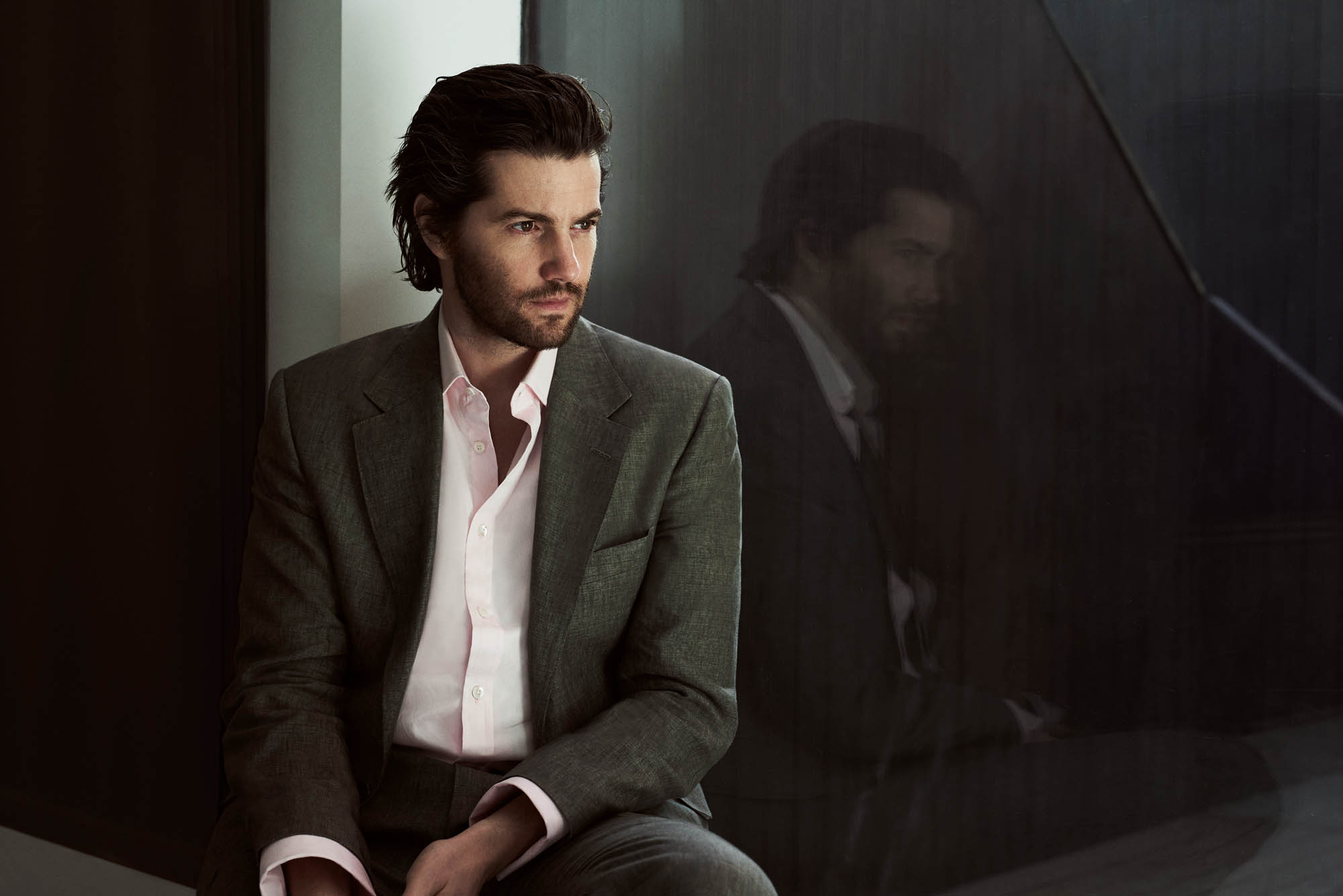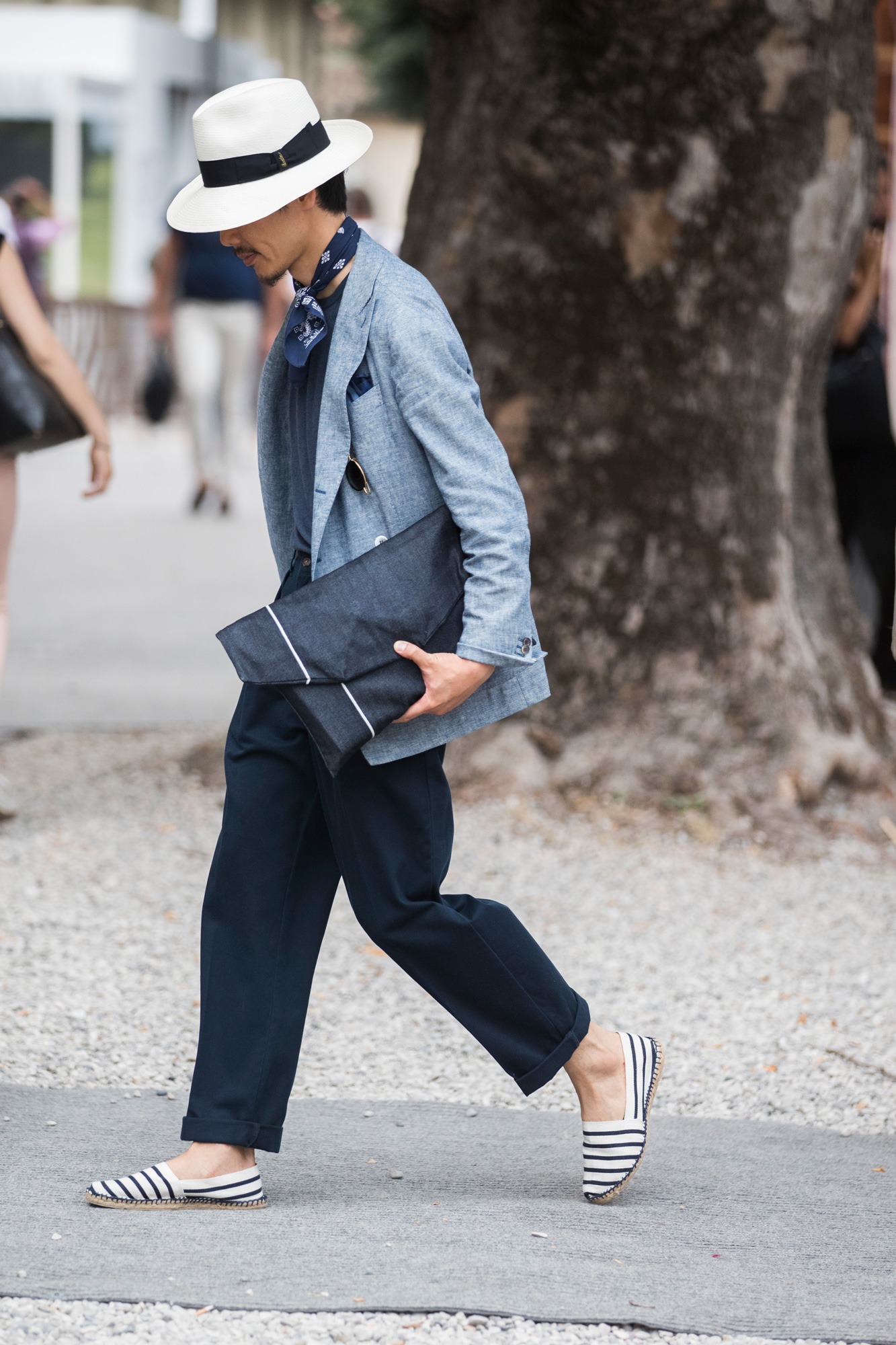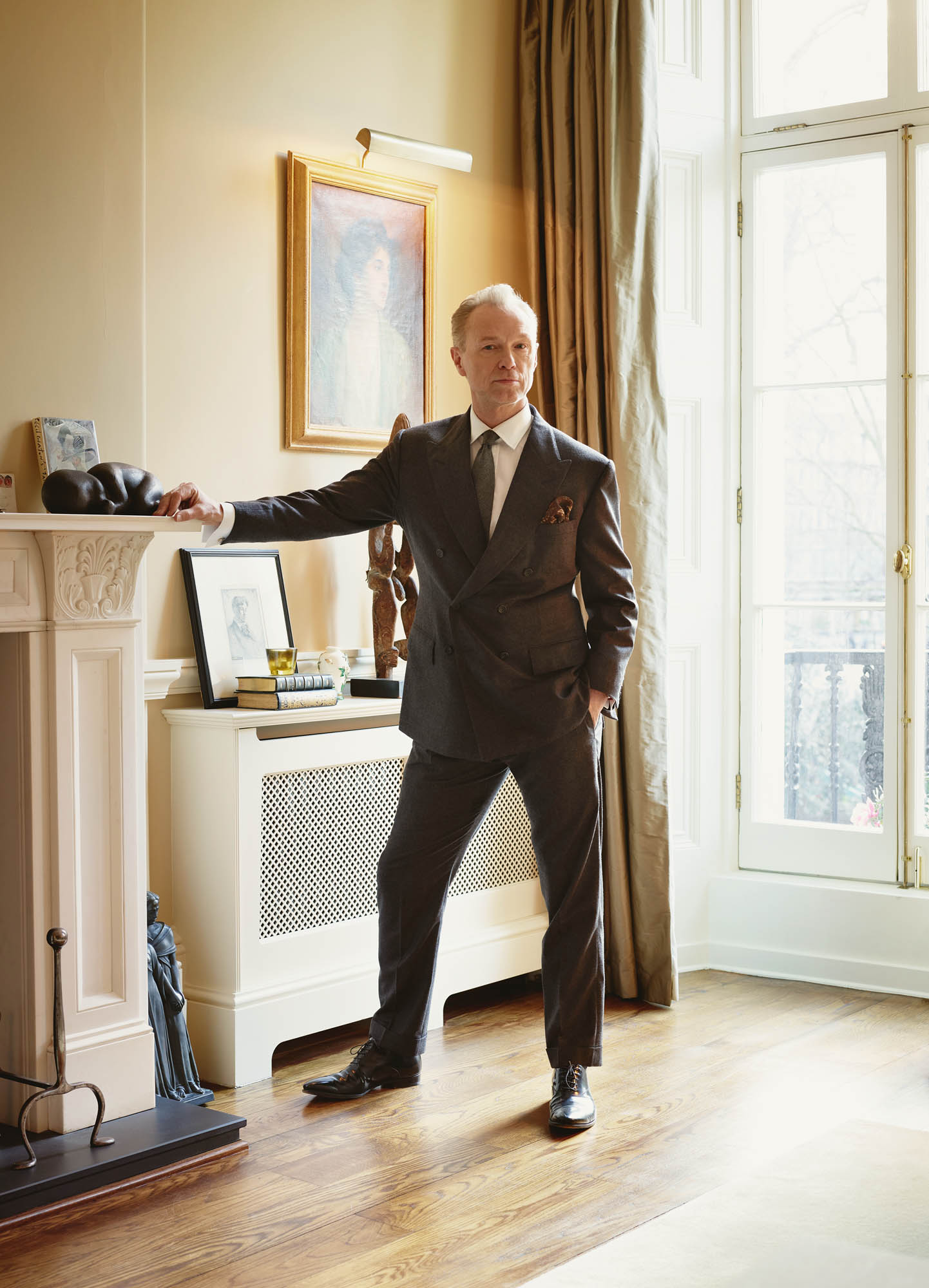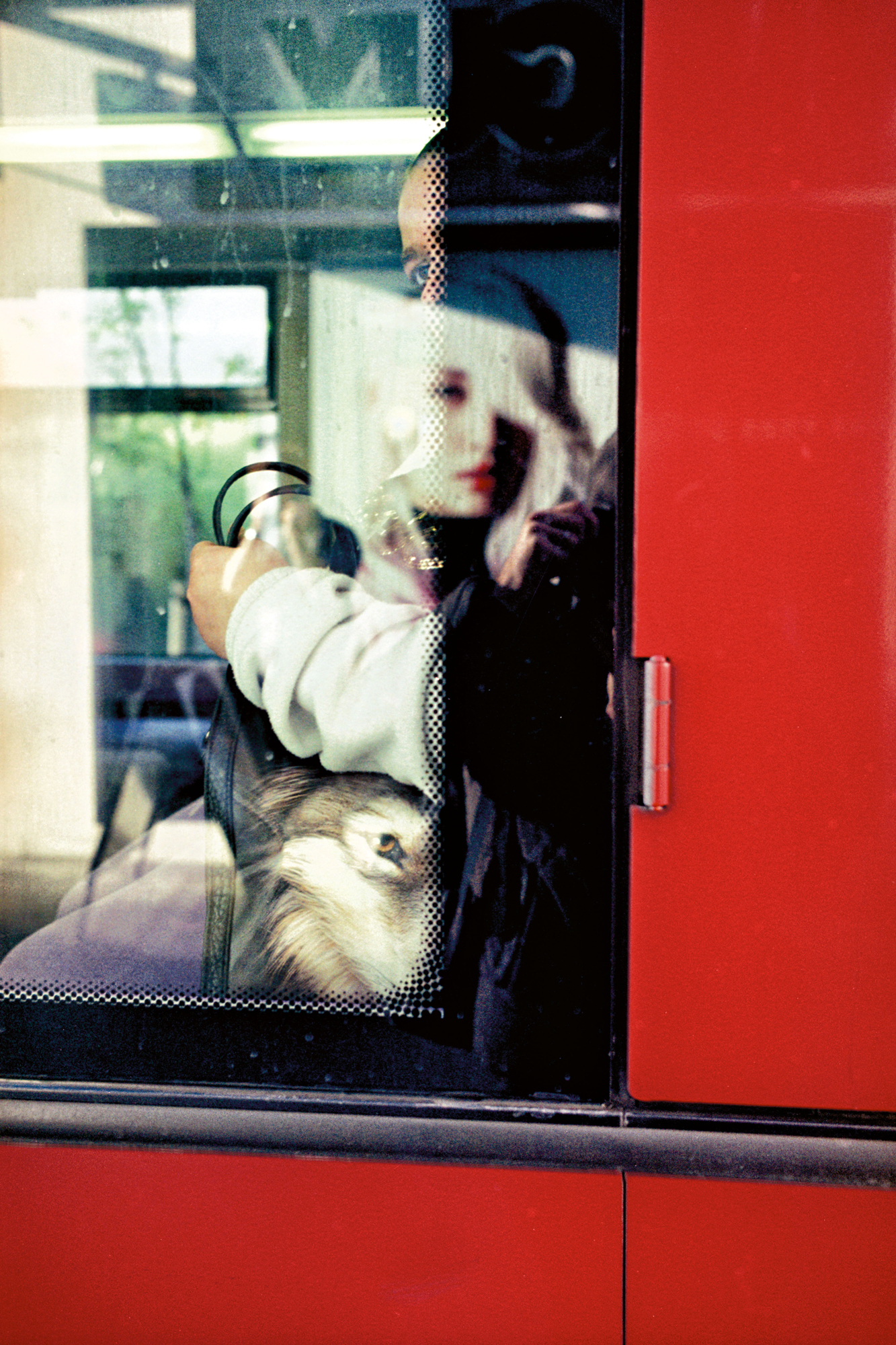As a fixture on the red carpet at Hollywood film premieres, Jim Sturgess has had to get used to being decked out by brands. “I remember the first time I got put in a suit,” the Wandsworth-born actor recalls. “I got on my bike the next day and delivered it back to them. They were like, ‘No, no, it’s yours, you can have it.’ I was like, ‘Are you joking?’”
Even now, selecting from English Cut’s vast menu is a novel experience for someone accustomed to choosing from a rail of off-the-peg suits. “It’s like ordering a salad in America,” he says of the bespoke process, speaking like a man who spends extended periods of time in health-conscious Los Angeles for work. “You have a million options: do you want three buttons or two? I got quite into it. You start off thinking, ‘Oh, I don’t mind.’ Then you go, ‘Actually, let me see what pleated trousers look like … ’”
After chewing it over, Sturgess settled on a rustic dark green. “I have a load of black and grey suits, so it was a chance to create something a bit different,” he explains. “It’s got a sort of tweed feel, a bit boxier than I’d typically go for … I’m sounding like a pro now, aren’t I?” His self-conscious laugh betrays that tailoring is not his, well, strong suit.
“I live in Dickies trousers and a pair of white canvas shoes,” confesses the fresh-faced 39-year-old, who could comfortably pass for a twentysomething and still dresses, by his own admission, like a teenage skateboarder, even if he no longer actually skates in the park like he did when he was a teenager growing up in Surrey. “I sort of still think that I do, but I don’t,” he says. “Last year, I was messing around on my board, and I fell off and really hurt myself. Like, it hurt and hurt for a long time. You start to learn the hard way that your body’s not the same as it once was. Plus I have to go and throw myself around and get beaten up for work. You get injuries, and it makes life pretty difficult.”

“You have a million options: do you want three buttons or two? I got quite into it. You start off thinking, ‘Oh, I don’t mind.’ Then you go, ‘Actually, let me see what pleated trousers look like’”
Sturgess does seem to have a history of being on the receiving end of on-screen violence, from 2008 thriller Fifty Dead Men Walking, in which he played a British agent infiltrating the IRA, with Sir Ben Kingsley as his handler, to 2016 US TV series Feed the Beast, in which he played a Bronx chef with David Schwimmer as his fellow restaurateur. “I’ve got a punchable face,” Sturgess quips. “I suppose I’m attracted to stories that have an edge. Now I just assume that’s what acting is: getting beaten up.”
Most recently, he was punched in the face by model-slash-actress Agyness Deyn – with a brass knuckle – for Hard Sun. (She learnt Israeli special forces fighting system Krav Maga for the role.) Written by Neil Cross, the scribe behind Idris Elba series Luther, the pre-apocalyptic BBC series stars Sturgess and Deyn as police detectives who inadvertently uncover a government-level conspiracy to conceal the inconvenient truth that the sun is going to destroy the Earth in five years. As knowledge of impending doom becomes more widespread, the fabric of society begins to unravel.
At the time of writing, Sturgess has been selling Hard Sun to audiences in America. “They get bombarded with a lot of regal stuff, and they have a particular idea of what England looks like and sounds like,” he says. “It’s nice to show another side of London – a bit more contemporary.” Less like, say, 2008’s Tudor period drama The Other Boleyn Girl, where he played the brother of Natalie Portman’s Anne and Scarlett Johansson’s Mary, with Eric Bana as Henry VIII. Besides, Hard Sun is “very international”, even if it’s set in the UK: “If you live on this planet, you’re definitely involved.”
Hard Sun also involved Sturgess wearing a suit every day, something he’d usually only do on special occasions. “It killed the joy,” he says. “I remember going to the Baftas, so I got out of one suit that I’d been wearing for months and put on another. Normally I’m pretty scruffy, so to put on a suit is quite a big change. It’s nice to put something on occasionally and feel a bit … You just feel different in a suit, don’t you?”
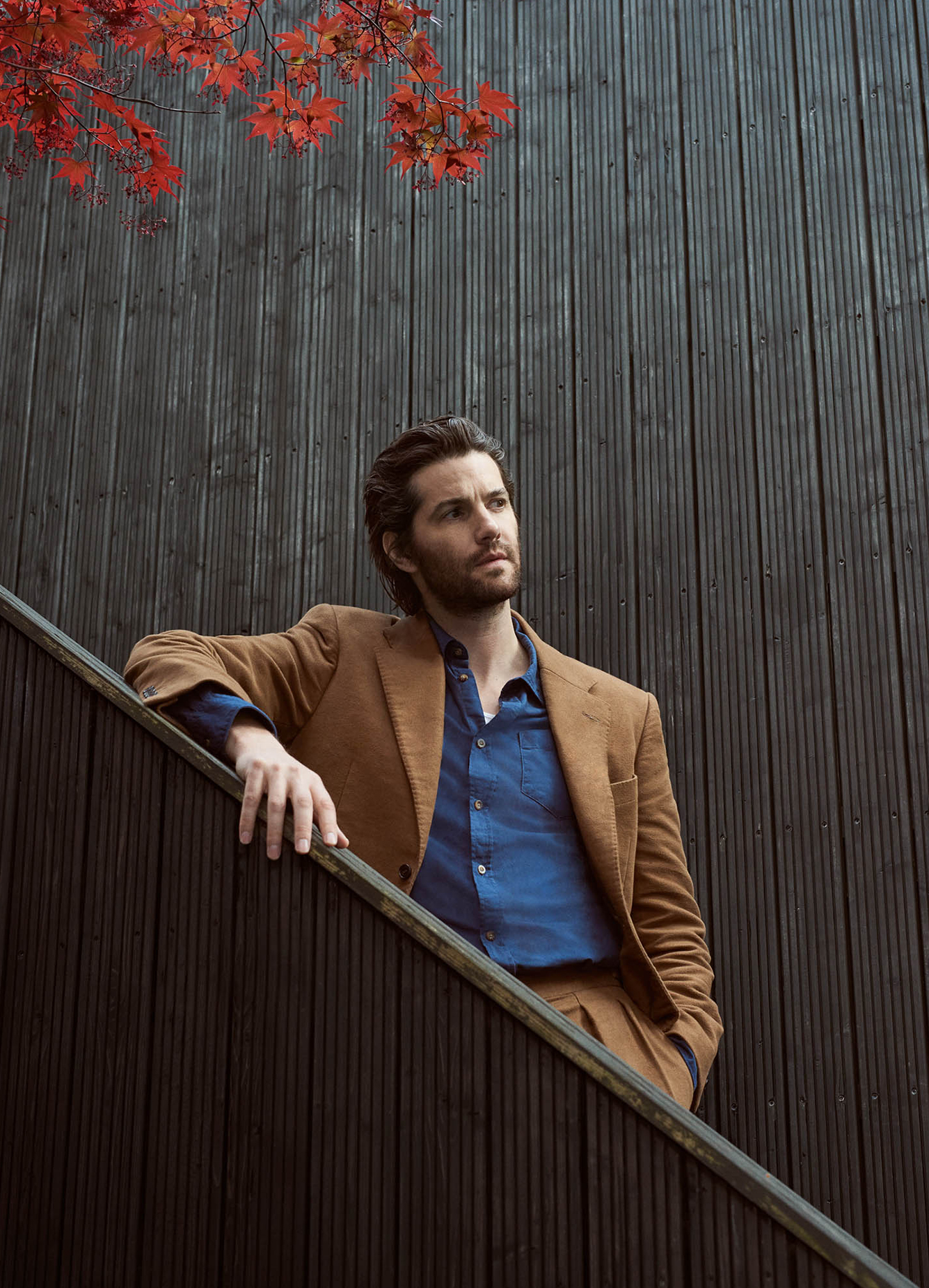
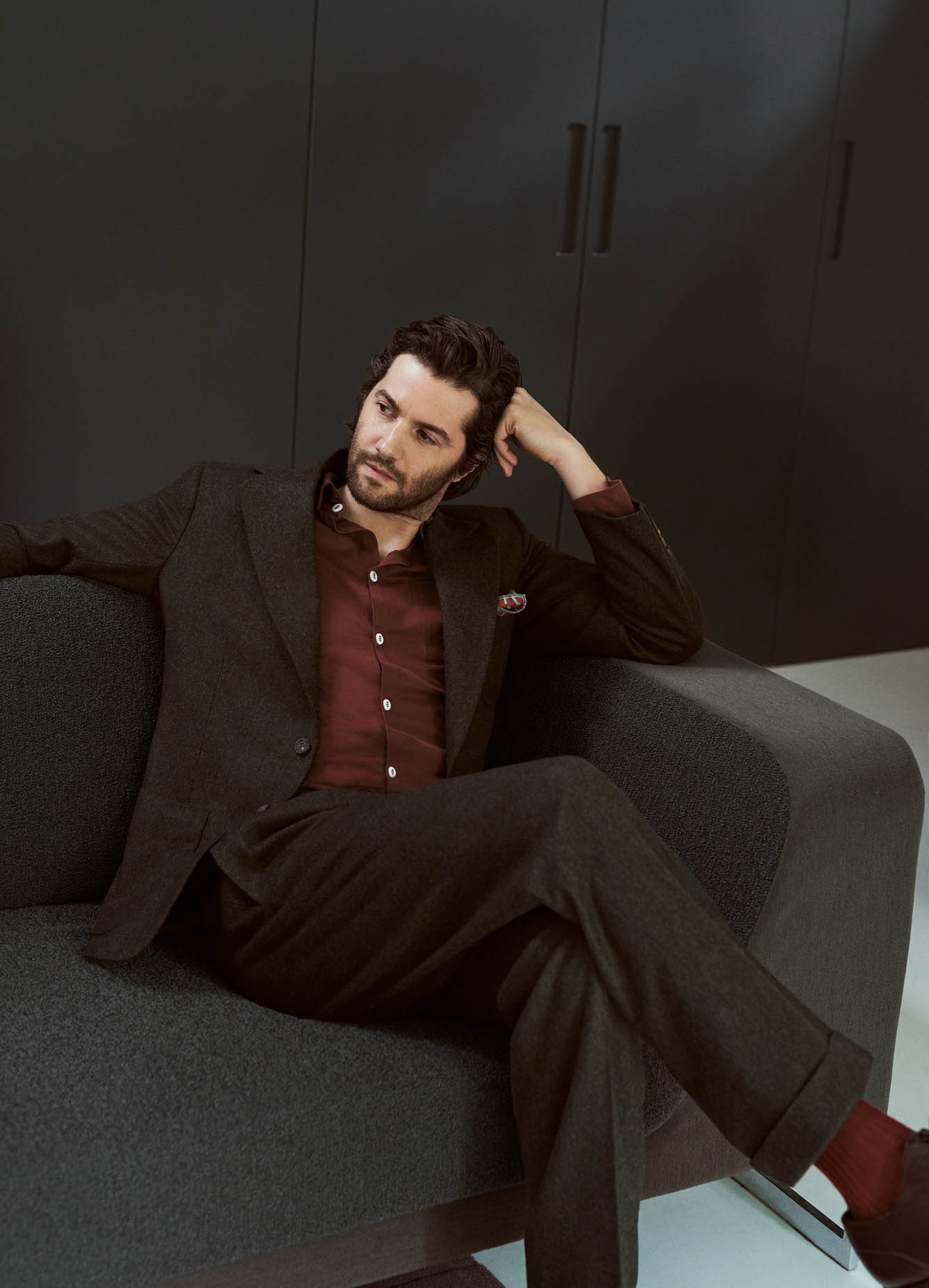
Sturgess feels different whenever he gets into costume for a role. “It’s when the character comes alive, when you put on his clothes and the shoes that he wears,” he says. “It’s your identity. When you put on a different pair of shoes, you feel like a different version of yourself. So it’s really not until you put the costume on, clothes that you’ve specifically chosen to represent the character, that you understand, ‘OK, this is who he is.’” It’s surprising to hear that it all comes together at that late a stage, albeit after much planning and research. “Yeah, for sure,” insists Sturgess. “It’s always a very exciting moment, actually, when you go, ‘All right, there he is. That’s the way he’s going to look.’”
One of Sturgess’s most sartorially memorable roles was the one furthest removed from any semblance of fashion: 2010’s The Way Back, inspired by the memoir of a Polish officer who claimed to have escaped from a Siberian gulag during WWII and trekked 4,000 miles across the Himalayas to British India. (A 2006 Radio 4 documentary questioned the veracity of the account, although there is evidence that someone did do the walk – just not the author.) “One of the great things that the survival expert told us was that you would never throw anything away,” remembers Sturgess. “So you wouldn’t get rid of your jacket, even in the desert – you’d cut it up and wear it as a headband.”
Sturgess went straight from that to 2011’s One Day, the adaptation of the then-unavoidable David Nicholls novel with the instantly recognisable orange cover. Over the course of two decades of on-off romance with Anne Hathaway’s Emma, his character Dexter graduates from student to successful 90s TV personality. “Suddenly I’m in a tight pair of leather trousers and a giant jacket,” Sturgess laughs. “You couldn’t feel more different. And the clothes definitely navigate those feelings.”
Those feelings were more combative in the case of London Fields, the adaptation of the Martin Amis novel also starring Billy Bob Thornton, Johnny Depp and Amber Heard, which has been trapped in legal limbo since 2015 after the director sued the producers for allegedly releasing their own cut (panned by the few critics who saw it). Sturgess played petty criminal and pub darts virtuoso Keith Talent, covered in tattoos and a grimy beard that made him feel “a bit tastier than I probably was”. This nearly proved disastrous when someone almost ran him over in a car: “I got really aggressive with him, and quickly realised that he was double my size.” Still, at least he’s used to being beaten up.
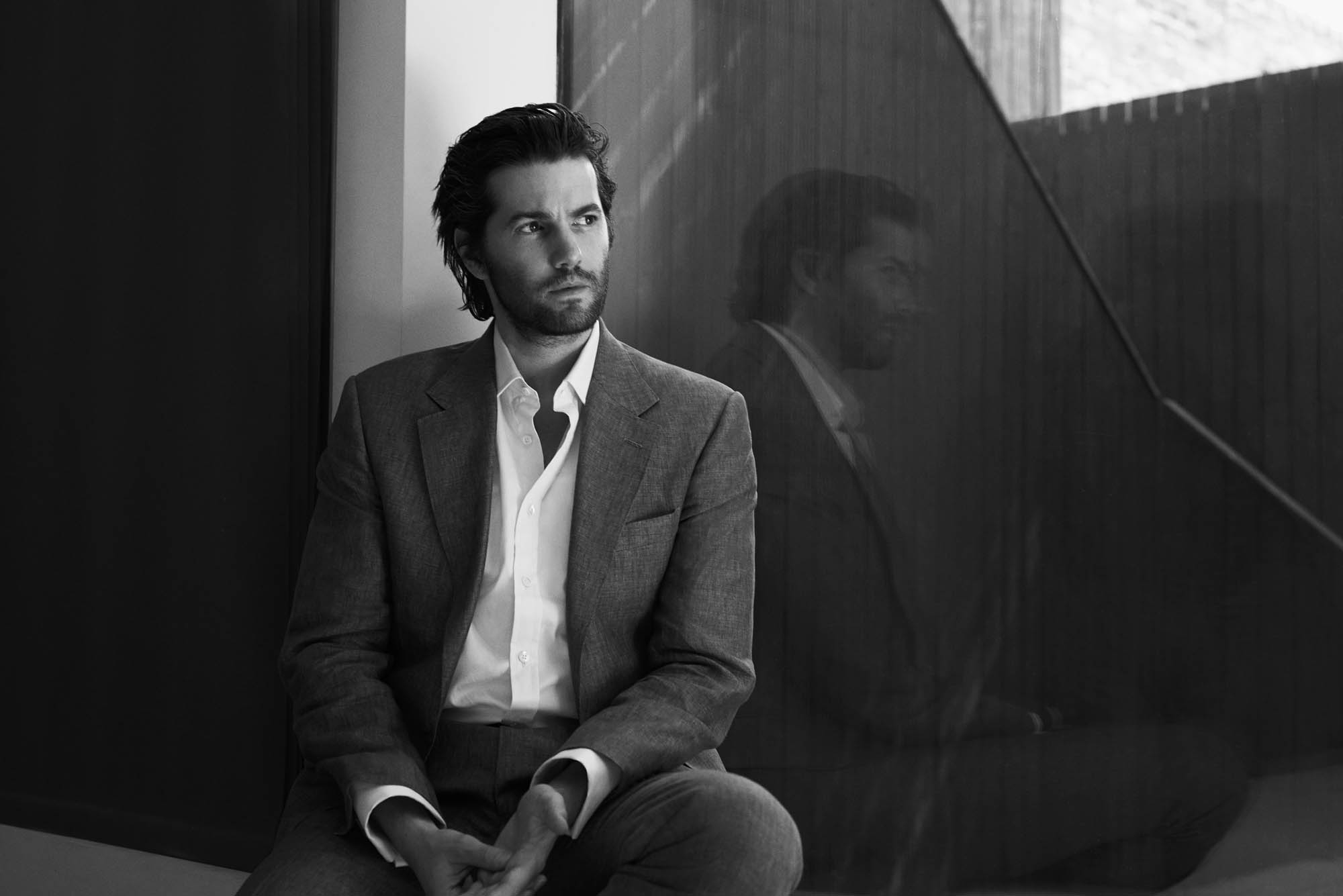
Sturgess’ own sartorial identity was influenced by American skateboarding culture. “Certainly, when I was in my teenage years, I was very skateboard-heavy in my fashion,” he says. “And now most people look like skateboarders. It blows my mind that the standard footwear is a pair of Vans. Because when I was younger only someone who was into skateboarding would wear Vans.” He’s similarly bemused that lowly streetwear brands have ascended to the height of fashion, and that kids now queue round the block and overnight for the latest product drop at the Supreme store he used to wander into when it was just a skate shop. At the same time though, he totally gets it.
“I remember my mum trying to put me into a pair of shoes that weren’t Converse All Stars,” he says. “They looked exactly the same, and they’d probably be way cooler now, but I was mortified. I was like, ‘No, they have to be Converse.’ My mum was like, ‘But they’re too expensive. These one look exactly the same – they’ve even got a star.’ And I was in tears: ‘Mum, you don’t understand. I can’t wear these to school: I’ll get crucified.’”
The other major key to Sturgess’s wardrobe choices was music. He started a band when he was 15, singing and playing bongos in pubs despite being under-age. When school and the band finished, he went to the University of Salford to study media and performance, and be closer to the Manchester music scene. “There were a lot of jackets done up to the top and desert boots,” he says. “I miss that different kinds of music were so influential in the way people dressed. It was almost like a gang mentality: you’d have mods, you’d have rockers, you’d have two-tone … And now everyone looks roughly the same. But maybe that’s because I’m just hanging out with 40-year-old men. I don’t know.”
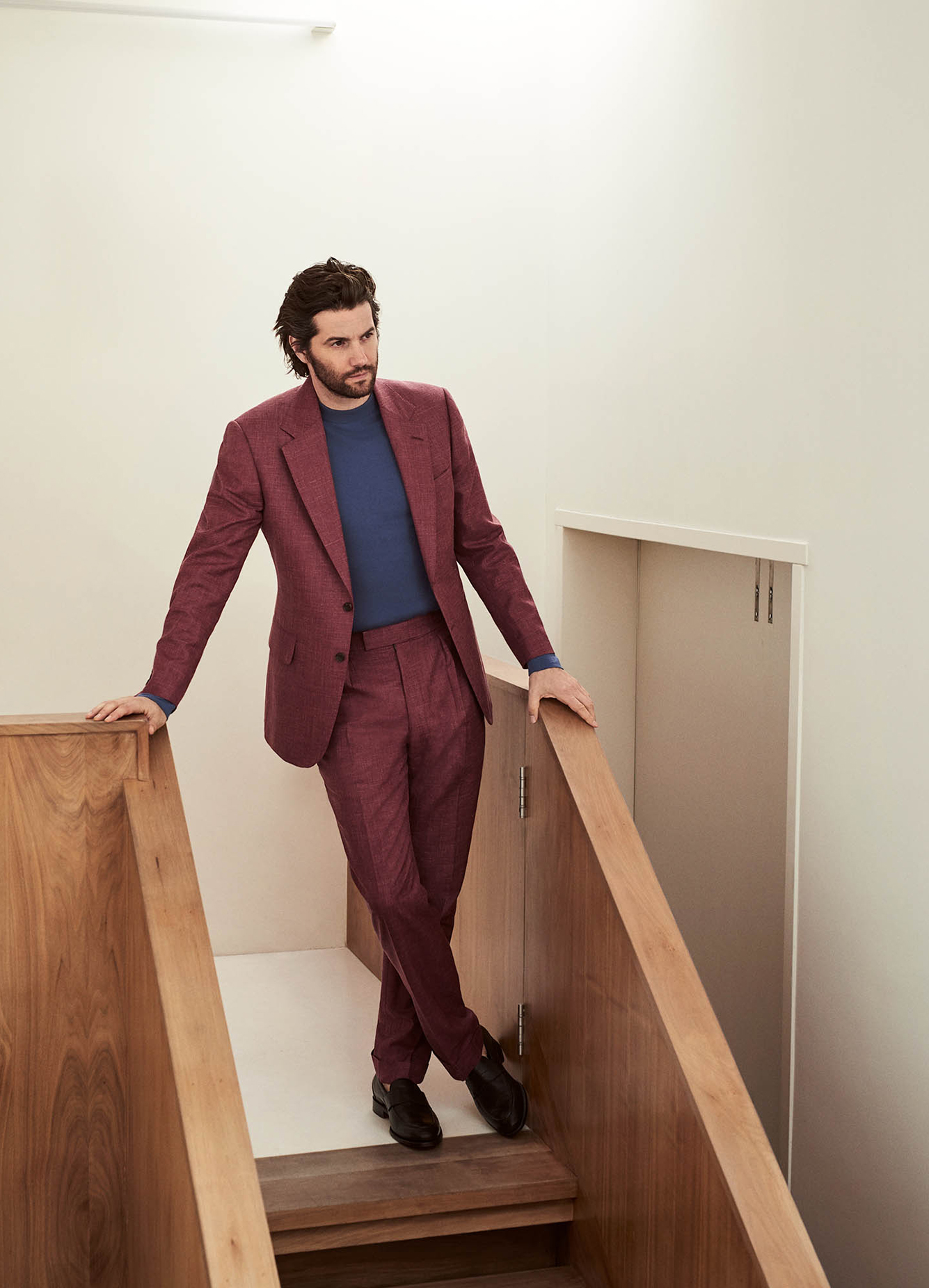
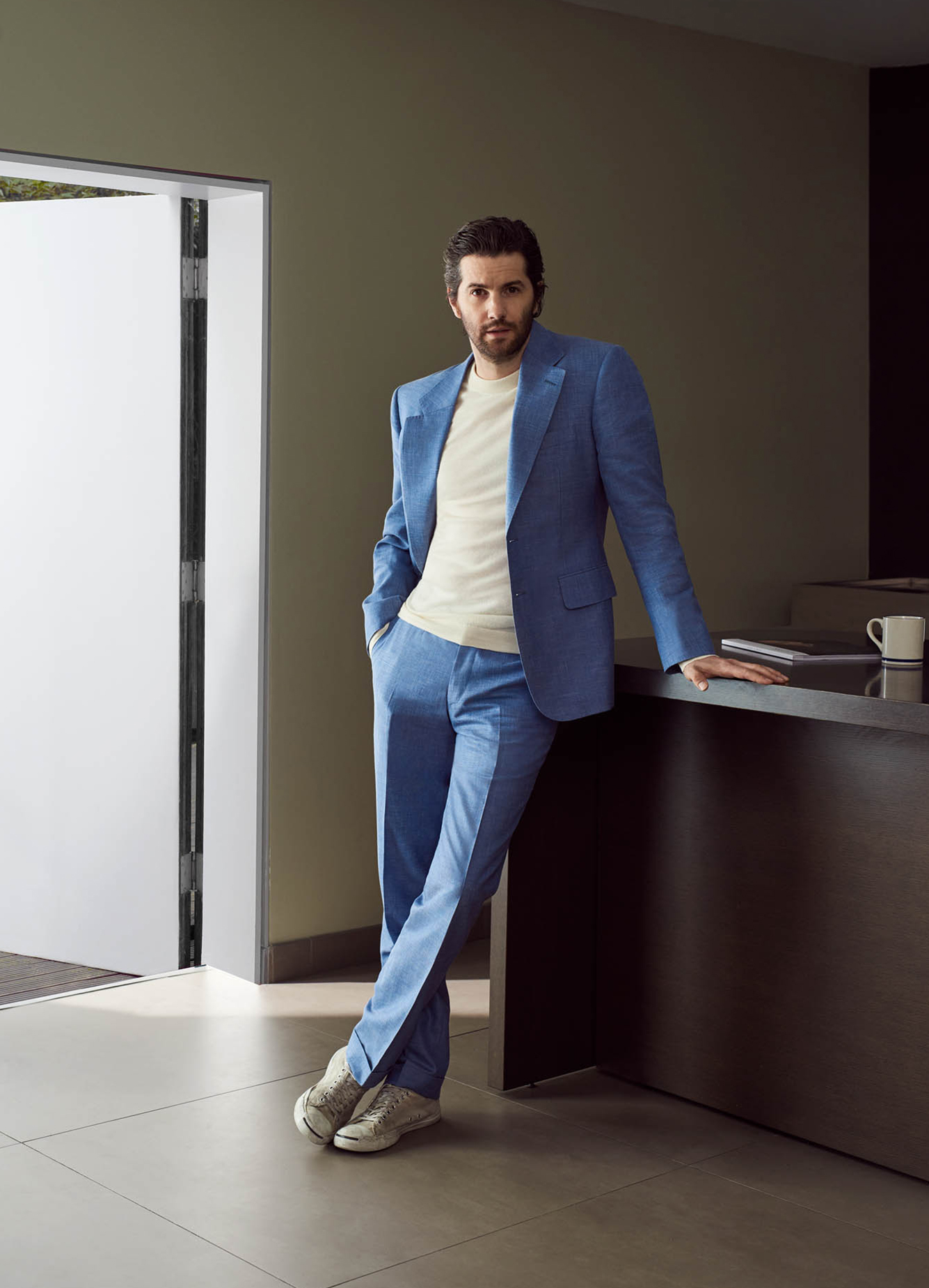
Sturgess was as obsessed with films growing up as he was records. “Even at school, drama and music were the two things I was interested in,” he says. His uni course taught him scriptwriting, editing and theatre production as well as acting; he wrote and performed a one-man show called Buzzin’ that brought him to the attention of an agent, who encouraged him to move to London. Instead of kickstarting his acting career, he got into the Camden music scene and started a band called Saint Faith, taking bit parts in TV and ads to pay the rent. When they broke up, Sturgess was cast in 2007’s Across the Universe, a film musical based on Beatles songs and a perfect fit for his skill set.
The common thread between music and acting is creativity and, perhaps not obviously in the latter’s case, self-expression. “It’s interesting because they’re very similar and totally opposite at the same time,” says Sturgess. “When you’re writing and playing music, it’s completely you, naked and bare; when you’re acting, you’re pretending to be somebody else. But you use your own emotions and life experiences to try and relate to the character. At the same time, people behind a microphone are playing some sort of a character. They might tell you that they’re not, but there is a level of performance that isn’t you while you’re just sitting with your mum and dad having a roast dinner.”
Sturgess describes his diversion into acting as “circumstantial”; even now that he’s a star, music remains a big part of his life. “I’ve got a little studio at home, and then a lot of my friends are musicians,” he says. Over the years and the various bands, he’s amassed a vast quantity of unreleased material; he’s just now really putting his mind to doing something that might actually get out there. “I just want to finish a cohesive record that kind of has a beginning, a middle and an end,” he says. “Not just a load of scratchy demos that are all just lying around that could potentially grow into something great.”
Songwriting inspiration can strike Sturgess in different ways. “Sometimes it’s just a thought,” he says. “Sometimes you’ll be messing around on the guitar and a little melody comes into your head, but you have no idea what the song’s about. Sometimes it’s lyrics: you build a song around the words first. Sometimes you can hear a drum loop, someone starts messing around with some melodies and then you just start singing on top.” Either way, it tends to be followed by a great deal more perspiration: “the grinding bit”.
Sometimes Sturgess will know from the first page of a script how he’ll play a character – and sometimes not. “I’ve been offered things and I’m like, ‘I don’t know why you’re asking me to do this,’” he admits. “And that’s always quite exciting because it’s out of your comfort zone. You have to build a character, and change the way you speak and move.” For that, he accesses a database being constantly compiled. “Sometimes you’ve got a character in your head that you’d love to find a story for, and then you read something and go, ‘I could put that into this,’” he says. “Or you’ve noticed somebody on the Tube: ‘That’s interesting, the way he is.’ Then you read something and go, ‘I could use a bit of that.’”
Getting noticed on the Tube is not something that Sturgess has to worry about – not even on buses with a picture of his face on the side. “Nobody’s that interested, really, so it’s very grounding,” he says. “In LA, people are very excited about movies, it’s an city built around the movie industry, and actors are kind of the commodity of that industry. So you feel a bit of treatment that you definitely don’t get when you come home.” London brings him back down to earth with a bump: “I’m very quickly getting knocked over on the Underground.” He tells an anecdote about a foreign tourist at King’s Cross who kept saying to him, “You’re a star, you’re a star.” Turned out she was looking for the Eurostar.
That probably has more to do with Sturgess’s down-to-earthness than any lack of profile. Certainly, though, his flight path has brought him into the orbit of some massive stars. Like Tom Hanks, his co-star on 2012’s Cloud Atlas, who Sturgess describes as “the nicest guy you could possibly imagine” (exactly how you’d imagine him, then). “He took it on himself to organise a movie night every Sunday at his apartment in Berlin,” Sturgess says. “He’d order loads of food and put out the word to the cast and crew. And we’d all pile round there, hungover from Saturday night, to sit on his couch and watch movies.” Hanks would also talk with Sturgess about music: “He knew quite a lot about hip-hop.”
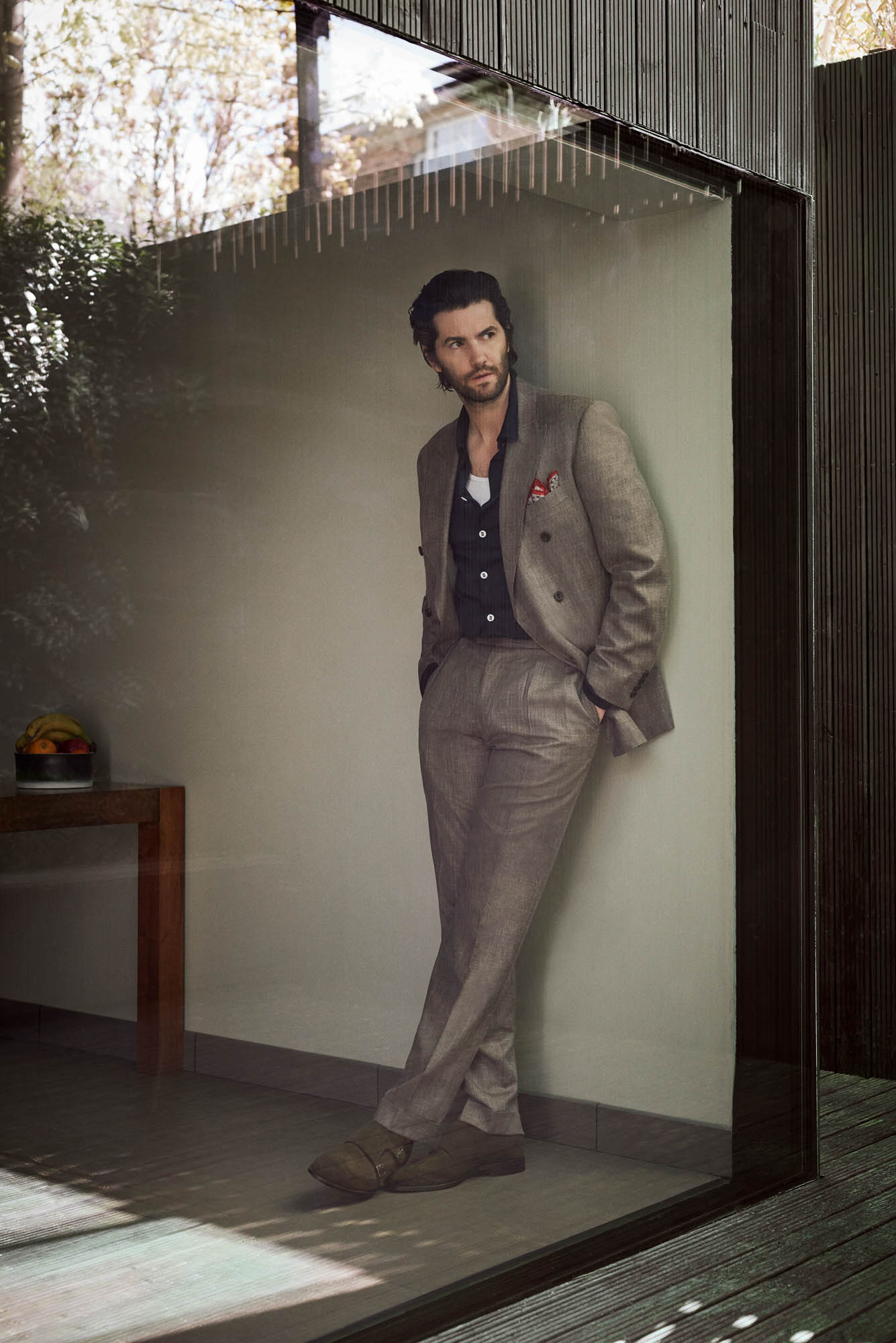
Ed Harris, his co-star on The Way Back, is another. “He was one of the first actors that I worked with who I was so in awe of, and who became a friend, which was amazing,” says Sturgess. “He really took me under his wing, we bonded and we’ve stayed in touch ever since.” A surreal scene ensued in a hotel in New Orleans where the pair were working together for a second time, on 2017’s Geostorm. “We bumped into Billy Bob Thornton, who I’d just done a film with in London, in the foyer of the hotel,” says Sturgess. “We were in an elevator – a lift – and I introduced Ed Harris to Billy Bob Thornton. And I was just standing in the middle of two of the coolest dudes I know.”
Sturgess doesn’t know what the future holds, beyond the release of two films that he shot after Hard Sun. The first, JT Leroy, is the strange but true story of a woman, played by Laura Dern, who writes a fictional memoir in the persona of a 15-year-old boy. When it becomes a literary sensation, she convinces the younger sister of her boyfriend, played by Kristen Stewart and Sturgess respectively, to masquerade as the non-existent male author – for six years. The second, Berlin, I Love You, is an anthology of 10 romantic stories set in the German capital and the latest in the series that began with 2006’s Paris Je T’’Aime; Dame Helen Mirren and Keira Knightley grace the ensemble cast.
“It always surprises you,” Sturgess says of his fluid profession. “Which I quite like. What’s going to happen next? What sort of story am I going to be involved in telling?” Back in his normal “scruffy” clothes, he blends into the Chiltern Street foot traffic like a chameleon, just another anonymous extra in the movies of everyone else’s lives.
